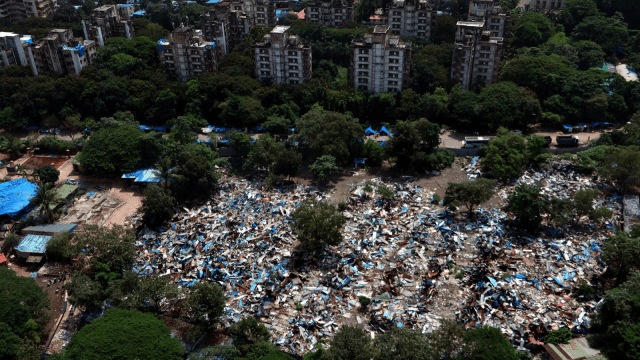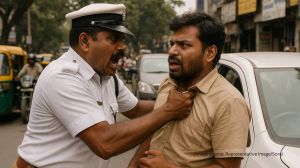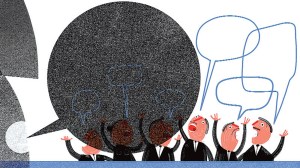‘We don’t have hope left anymore’: In Jai Bhim Nagar demolition row, residents clueless whether filing of FIR would assuage their crisis
BMC demolished nearly 500 unauthorised structures at Jai Bhim Nagar in Central Mumbai on June 6, 2024, rendering its residents homeless; over 55 people were injured in the clashes between residents and municipal personnel.
 Aerial view of Jaibhim Nagar a few days after the demolition drive took place. (Express photo by Amit Chakravarty)
Aerial view of Jaibhim Nagar a few days after the demolition drive took place. (Express photo by Amit Chakravarty)Nearly eight months since the Brihanmumbai Municipal Corporation (BMC) razed over 500 shanties at Powai’s Jai Bhim Nagar, the Mumbai police on Tuesday booked senior civic and police personnel for carrying out the drive during monsoon without prerequisite clearances from State Human Rights Commission (SHRC). But for the residents of the slum, many of whom continue to dot the streets, the “delayed action” from the police hardly made a difference to their state of affairs with many of them even struggling to get water for daily needs. The slum dwellers say they are clueless about what the filing of First Information Report means to them.
On Wednesday, Shreemati Chauhan, 45, was seen busy reconstructing her make-shift house along Powai’s 90-feet-road, trying to make it snake-proof and withstand the summer heat. “Our problems are increasing by the day but we are yet to hear from the authorities. We had been living at Jai Bhim Nagar since 2004 but lost everything all of a sudden, last year. Despite the FIR, we have received no aid and are even struggling to get adequate water,” said Chauhan.
BMC demolished nearly 500 unauthorised structures at Jai Bhim Nagar in Central Mumbai on June 6, 2024, rendering its residents homeless. The drive took a violent turn following clashes between residents and municipal personnel that left over 55 people injured. Even as the civic body claimed that the action was based on directives from the SHRC, the drive drew flak from activists who pointed to a government resolution that prohibits demolitions during the monsoon (June 1-September 30).
“While my son who was at the police station told us that an FIR had finally been filed, we have received no news from the authorities and nobody has approached us guaranteeing any kind of relief,” said Chauhan.
While several affected families have relocated to nearby ‘chawls’ in the months following the demolition, nearly 40-50 families, including the Chauhans, continue to live on the streets.
“Since we have no proper house, there is high chance for our wares to get stolen. Therefore, it is impossible to leave the house unattended. I used to work as a domestic help but now due to this situation I am forced me to leave my work. How can we afford to pay Rs 15,000 to rent a space when we are struggling to earn even thousands? There is no surety of water supply from the BMC, with the tankers either delayed for days or coming at odd hours. That makes it even harder to leave the house,” said Chouhan, who was the sole breadwinner of her family of three.
Her son, Sagar Chauhan, had taken up the job of a delivery boy to support his family. “But I had to quit my job owing to a muscle problem which bars me from walking long distances. Even the doctors are unable to help me and we can’t afford any further treatments,” he said.
The eviction drive had sparked criticism, prompting the residents to file a petition in the Bombay High Court. After the Special Investigation Team (SIT), set up on the directive of the HC, found that the drive had been conducted without the SHRC orders, it informed the court in September 2024 that they would initiate action against the officials concerned.
A report published by Collective Mumbai showed that the residents are plagued by increasing cases of heatstroke, diarrhoea, jaundice, and allergic infections. The report, which was recorded during two medical camps by Sabki Library, also showed that cases of malaria, dengue, and typhoid were also registered after the eviction.
“We don’t even have any hope left anymore. With the lack of clean water and unsanitary conditions, my health is only deteriorating further,” another slum dweller, Jaidevi Mirge, who has been diagnosed with asthma and infections told The Indian Express.
According to Huma Namal, a member of Collective Mumbai, the issues of residents are bound to aggravate further with the summer season fast approaching. “While the delay in filing the FIR which the HC had directed months ago itself is very disturbing, the next hearing has now been scheduled for March. This consistent delay has resulted in increased problems for the residents of the area, for whom judicial justice is the only hope. Furthermore, the BMC has been denying adequate water and sanitation in an indirect attempt to drive the people away from the streets,” said Namal.







